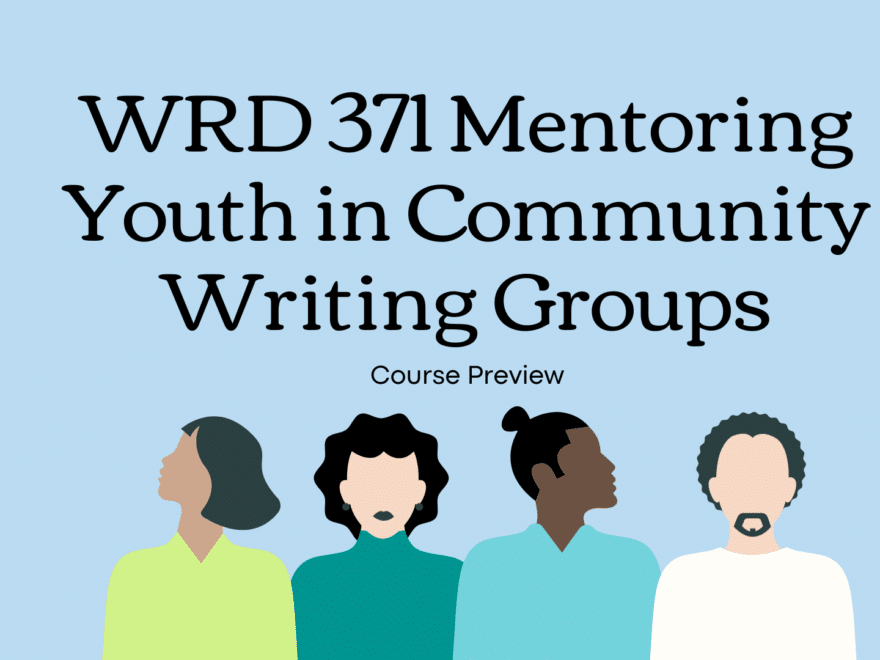Spring Quarter registration is almost upon us, so we caught up with Professor Jen Finstrom to get an early inside look at WRD 371 Mentoring Youth in Community Writing Groups. This collaborative course pairs students from DePaul with middle and/or high-schoolers to work together on their writing journeys.
1. What is your favorite part of teaching this course? (if you have taught it before)
I have taught this class before! I’ve been teaching it since Winter Quarter 2017, and I have a few favorite parts. One is certainly seeing the rapport build between the middle or high school students and the DePaul students. Much of that interaction happens either through written feedback (or more recently in zoom), and in addition to the poetry aspect of the course, the students we’re working with often have questions about college and choosing a major (plus things like what the res halls and cafeteria food are like) and that aspect of mentoring is a place where significant rapport develops.
I love reading the poems that come out of the course, but even more than reading them, I love hearing them performed out loud. At the end of the quarter, we find a way to have a performative event celebrating the wonderful work that everyone has accomplished. We have had those events both at our partner’s location and at DePaul. In 2019, we brought 120 sixth grade students from Maria Saucedo Scholastic Academy to the LPC Student Center for an open mic and pizza, and it was such a success! In 2021, we had a zoom open mic with Leo High School, and it was so incredible and inspiring. While an in-person poetry reading is certainly what we would prefer, seeing the affirmative chats as the audience responded to poems was heartwarming. Additionally, a few of the Leo students were on a bus heading to a baseball game, and they shared their poems from the bus because they didn’t want to miss the celebration. That was probably one of my favorite class moments overall!
2. Do your students seem to have a similar favorite?
I would say that the DePaul students have always enjoyed the end-of-the-quarter celebration, as well as helping in the planning of it. In reading student reflections, I also get to see the small moments that happen throughout the course as a whole where connections are made.
3.What are some major readings and projects students can expect?
Readings cover a lot of ground. We have readings that focus on poetry in the context of exploring identity and connecting with our pasts and the contexts in which we live. As this is a service-learning course, we also have readings and videos supplied by the Steans Center that ground the course in asset-based community development (ABCD).
Projects include leading class discussion in small groups, planning writing activities and other activities for our partners, and helping to plan any in-person activities such as visits to our partner school or welcoming them to our own space. Throughout the quarter, we learn about poetry as an identity-building activity, as well as how to provide feedback that affirms growth and revision. We write ongoing reflections about that work throughout the quarter, as well as one research-based essay that brings together the academic and experiential aspects of the course.
4. Do you have any advice for students who have not had a lot experience with children and/or teaching?
In the case of this upcoming quarter, we’ll be working with sophomores and seniors from Leo High School. One of the first questions I ask in an initial reflective assignment is for students in this course to imagine themselves at the age of the students that we’ll be working with and to reflect on what they would have made of the experience to gain feedback on poetry from college students. We also talk at length about prior experience as a mentor or mentee (either formal or informal) and how the communities that we are a part of support us and what we give back to those communities.
5. Any major changes to the course being partially online?
This course has always had a remote element, which likely made the transition to fully remote a bit easier. In the years that I’ve taught this course, much of the feedback we provide is asynchronous written feedback. However, in 2021, we were able to interact with the Leo High School students in Zoom more frequently. The ability to both interact in real time with the Leo students and give written comments on drafts made the feedback and the interactions even more meaningful.
